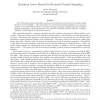Free Online Productivity Tools
i2Speak
i2Symbol
i2OCR
iTex2Img
iWeb2Print
iWeb2Shot
i2Type
iPdf2Split
iPdf2Merge
i2Bopomofo
i2Arabic
i2Style
i2Image
i2PDF
iLatex2Rtf
Sci2ools
130
click to vote
CORR
2002
Springer
2002
Springer
Quantum Lower Bound for Recursive Fourier Sampling
One of the earliest quantum algorithms was discovered by Bernstein and Vazirani, for a problem called Recursive Fourier Sampling. This paper shows that the Bernstein-Vazirani algorithm is not far from optimal. The moral is that the need to "uncompute" garbage can impose a fundamental limit on efficient quantum computation. The proof introduces a new parameter of Boolean functions called the "nonparity coefficient," which might be of independent interest. Like a classical algorithm, a quantum algorithm can solve problems recursively by calling itself as a subroutine. When this is done, though, the algorithm typically needs to call itself twice for each subproblem to be solved. The second call's purpose is to uncompute `garbage' left over by the first call, and thereby enable interference between different branches of the computation. Of course, a factor of 2 increase in running time hardly seems like a big deal, when set against the speedups promised by qu...
Related Content
| Added | 18 Dec 2010 |
| Updated | 18 Dec 2010 |
| Type | Journal |
| Year | 2002 |
| Where | CORR |
| Authors | Scott Aaronson |
Comments (0)

